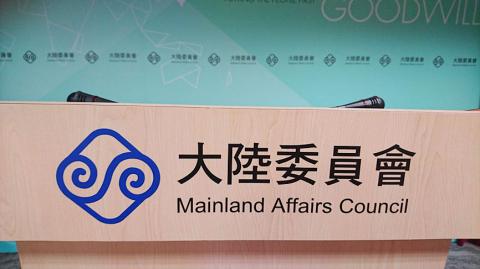The Mainland Affairs Council (MAC) yesterday urged Beijing to refrain from unilaterally interpreting Taiwanese expectations of cross-strait relations to avoid misjudging the situation after China’s Taiwan Affairs Office said that the results from Saturday’s elections reflected the majority’s hopes of benefiting from peaceful ties.
The nine-in-one local elections and 10 referendums held alongside them were an internal affair, and their results are a testament to the mature development of democratic politics, the council said.
“This is at the core of Taiwan’s democratic value, something Beijing should respect and understand accurately,” it said.

Photo: Chung Li-hua, Taipei Times
“It [China] should neither interfere in our internal affairs, nor unilaterally interpret Taiwanese expectations. Doing so could lead to a misjudgement of cross-strait situations,” the council said.
Taiwan Affairs Office spokesman Ma Xiaoguang (馬曉光) yesterday said the results, with the Chinese Nationalist Party (KMT) winning 15 out of the 22 cities and counties, were an indicator that most people in Taiwan hope to continue enjoying the benefits that the peaceful development of cross-strait relations could bring.
The KMT only won six cities and counties in the 2014 elections.
“We will continue to adhere to the 1992 consensus, staunchly oppose pro-independence separatist forces and activities, and unite the people of Taiwan and bring them on the path of peaceful development of cross-strait ties,” Ma said in Beijing.
More city-to-city exchanges and cooperation across the Taiwan Strait on the basis of a “correct perception of the nature of cross-strait relations and city-to-city exchanges” would be welcomed, he said.
Ma also took a swipe at the initiator of a referendum seeking to rename Taiwan’s Olympic team, saying that its failure showed that it was an unpopular attempt to put the rights of Taiwanese athletes at stake and that the pro-independence movement is doomed to fail.
The referendum only received 4,763,086 “yes” votes, or 24.11 percent of eligible voters. A total of 5,774,556 voted “no.”
“The government has maintained a consistent stance to safeguard the peaceful and stable status quo of the Taiwan Strait and our national sovereignty. This is a consensus shared by the people of Taiwan and the expectation of the international community,” the council said, urging Beijing to face the cross-strait reality pragmatically.
The “1992 consensus” — a term former Mainland Affairs Council chairman Su Chi (蘇起) admitted making up in 2000 — refers to a tacit understanding between the KMT and Beijing that both sides acknowledge that there is “one China,” with each side having its own interpretation of what “China” means.
The Democratic Progressive Party administration has refused to acknowledge the consensus.

CHAOS: Iranians took to the streets playing celebratory music after reports of Khamenei’s death on Saturday, while mourners also gathered in Tehran yesterday Iranian Supreme Leader Ayatollah Ali Khamenei was killed in a major attack on Iran launched by Israel and the US, throwing the future of the Islamic republic into doubt and raising the risk of regional instability. Iranian state television and the state-run IRNA news agency announced the 86-year-old’s death early yesterday. US President Donald Trump said it gave Iranians their “greatest chance” to “take back” their country. The announcements came after a joint US and Israeli aerial bombardment that targeted Iranian military and governmental sites. Trump said the “heavy and pinpoint bombing” would continue through the week or as long

TRUST: The KMT said it respected the US’ timing and considerations, and hoped it would continue to honor its commitments to helping Taiwan bolster its defenses and deterrence US President Donald Trump is delaying a multibillion-dollar arms sale to Taiwan to ensure his visit to Beijing is successful, a New York Times report said. The weapons sales package has stalled in the US Department of State, the report said, citing US officials it did not identify. The White House has told agencies not to push forward ahead of Trump’s meeting with Chinese President Xi Jinping (習近平), it said. The two last month held a phone call to discuss trade and geopolitical flashpoints ahead of the summit. Xi raised the Taiwan issue and urged the US to handle arms sales to

State-run CPC Corp, Taiwan (CPC, 台灣中油) yesterday said that it had confirmed on Saturday night with its liquefied natural gas (LNG) and crude oil suppliers that shipments are proceeding as scheduled and that domestic supplies remain unaffected. The CPC yesterday announced the gasoline and diesel prices will rise by NT$0.2 and NT$0.4 per liter, respectively, starting Monday, citing Middle East tensions and blizzards in the eastern United States. CPC also iterated it has been reducing the proportion of crude oil imports from the Middle East and diversifying its supply sources in the past few years in response to geopolitical risks, expanding

Pro-democracy media tycoon Jimmy Lai’s (黎智英) fraud conviction and prison sentence were yesterday overturned by a Hong Kong court, in a surprise legal decision that comes soon after Lai was jailed for 20 years on a separate national security charge. Judges Jeremy Poon (潘兆初), Anthea Pang (彭寶琴) and Derek Pang (彭偉昌) said in the judgement that they allowed the appeal from Lai, and another defendant in the case, to proceed, as a lower court judge had “erred.” “The Court of Appeal gave them leave to appeal against their conviction, allowed their appeals, quashed the convictions and set aside the sentences,” the judges